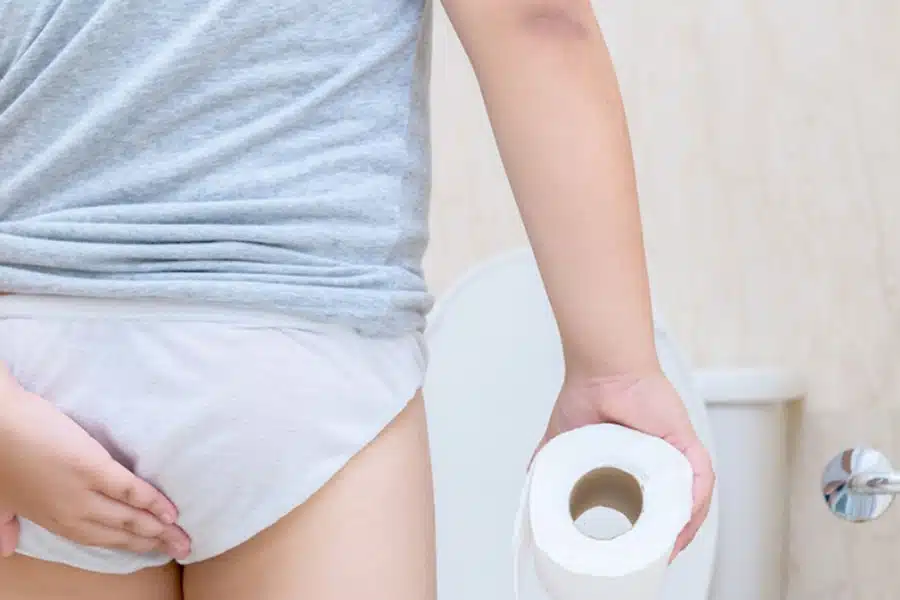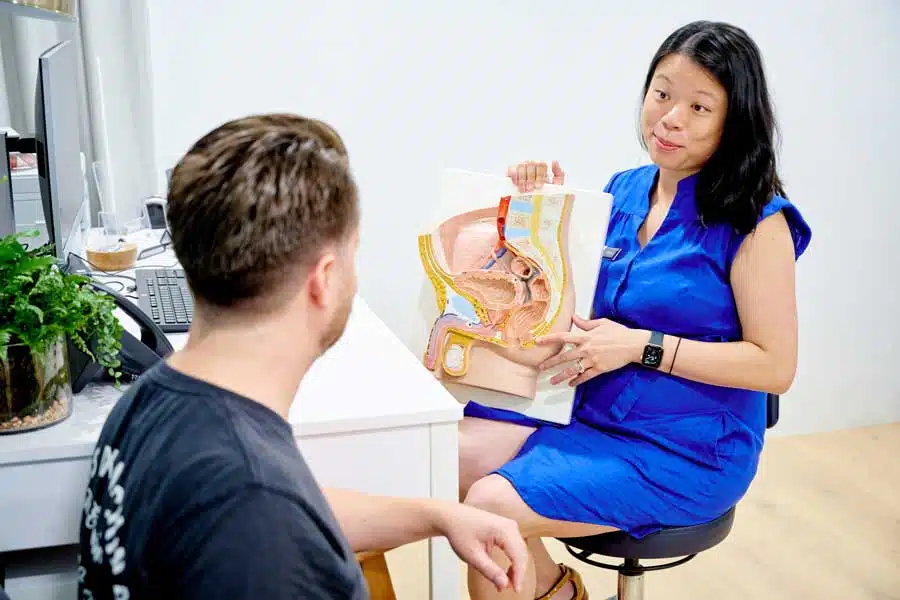Whether you’re dealing with a young child at potty training age, or an older child who is well past that stage, anyone can develop pain when using the washroom. Pain when urinating or defecating can be a symptom of a larger problem, which is why addressing these issues is so important.
This is especially true with children, who may feel less inclined to share symptoms and seek care as bathroom issues can feel private and embarrassing. Let’s explore some of the signs to watch for if you suspect your child is experiencing painful urination or defecation, and the potential causes for these issues.
Signs Your Child is Experiencing Toilet Time Pain
If your child feels pain passing urine or faeces, they may not share it outright. For younger children, especially during potty training, you might misinterpret bathroom avoidance as anxiety around the experience, and not pain. And as children get older, they may find bathroom pain embarrassing or confusing, leading to them hiding symptoms.
These are some common indicators that your child might be experiencing bathroom pain:
- Flushed, red face
- Abdominal pain
- Bathroom avoidance
- Complaining while using the washroom
- Nausea
- Loss of appetite
- Bloating
- Increased daytime or nighttime wetting
- Cranky mood
What Causes Pain During Toilet Time?
There are lots of different reasons your child could be experiencing pain while using the bathroom. Some common reasons include:
Constipation
Constipation is a condition where your child will struggle to have frequent/regular bowel movements. This can lead to a buildup of faeces in the colons, causing abdominal pain, cramping, and bloating.
Children who deal with constipation may find an increase in severe pain while using the bathroom. This pain can happen while trying to go when your body can’t or having to defecate large/hard faeces because the faeces has been stuck in the colon for so long.
Constipation can happen for a number of reasons. It could be a result of a child’s diet, a symptom of a medication they’re on, or even a result of bathroom fear. If it’s beginning to cause your child pain during bathroom time, go to a healthcare professional for advice and potential treatment solutions.
Urinary Tract Infection
Urinary tract infections are more common in children than you’d think. This type of infection happens when bacteria build up in the urinary system, entering the bladder and kidneys.
When a child has a UTI, they will experience bladder pain and burning during urination, bloody/cloudy urine, and the need for more frequent urination. This can evolve into increased wetting problems, due to the constant urge to go.
To get a diagnosis, you will provide a doctor with a urine sample to check for infection in the child’s urine. Once confirmed, treatment will include a round of antibiotics to treat the infection.
If you suspect you have a child sick with a UTI, seek help as soon as possible. When left untreated, a urinary tract infection can evolve into a more serious bladder infection or kidney infection, which will have more severe symptoms.
Tears in Skin
It is possible that your child has irritated and torn skin around the genitals, leading to bathroom pain. This is an especially common cause of pain if your child has large and/or painful poop.
If your child has torn their skin in the genital area, the main symptom will be pain during bathroom time. You may also notice bloody stool or bloody urine when your child does go to the toilet. If you suspect the pain is a result of tearing like anal fissures, it’s important to seek help. When left untreated, bacteria can easily enter the wounds, leading to more pain and infection.
Dermatological Issues
There are different dermatological skin issues that a child can develop, leading to bathroom pain. For example, your child could have a bacterial infection in the form of a foreskin infection in boys, or vulvovaginitis in girls.
These issues are often identified by visible signs of skin irritation on the genitals, paired with a burning sensation during urination or when passing a bowel movement. If you suspect skin issues on your child’s genitals, try to look for any kinds of skin redness, bumps, or signs of infection on the skin, and ask them about pain during urination.
Working Through Bathroom Anxiety
Regardless of why your child is experiencing bathroom pain, it’s important to work through the feelings around it to avoid a build-up of anxiety. Bathroom issues can feel embarrassing and awkward to deal with, especially for children. The more time your child spends dealing with pain during bathroom time, the more likely they are to turn going to the bathroom into an anxiety-inducing situation.
That’s why we think it’s important to openly communicate with your kids, so they don’t have bathroom anxiety. If your child is fearful of the bathroom, try to find ways to associate the potty with a positive experience.
Encourage your child to sit and interact with their potty even when they don’t have to go, so they see it as a fun place. If your child is bored on the toilet, you can try reading or talking to them while they go to make it fun. And most important, never, ever shame your child when going to the bathroom.
If you punish or scold your child’s bathroom habits, it can lead to them developing more fear and anxiety. If your child has an accident, don’t punish them. Instead, clean up the mess together, and remind them they can try to make it to the potty next time!
The less anxiety your child has around the bathroom, the easier it will be to treat bathroom issues. Remember to always keep your approach light and talk to your children with patience and understanding.
Seeking Healthcare
When pain during bathroom time begins to interrupt daily life, it’s time to find a solution. Sometimes over-the-counter medications and home remedies just won’t help. That’s when the help of a Pelvic Health Physiotherapist can make a huge difference.
If you’re looking for healthcare support, reach out to our team at Sydney Pelvic Clinic. When you book a consultation through our Kids’ Continence service, you’ll receive the full support of one of our Pelvic Health Physiotherapists. They can do a full check up on your child’s health and development, determine the cause of any pain they experience, and work on a custom treatment plan suited to them.
With early intervention and physiotherapy treatment, your child can live a life free from bathroom pain. To meet with a health professional from SPC and book a consultation, click here.

